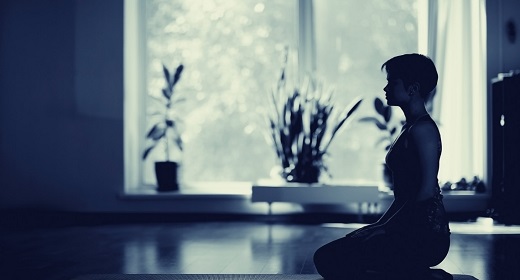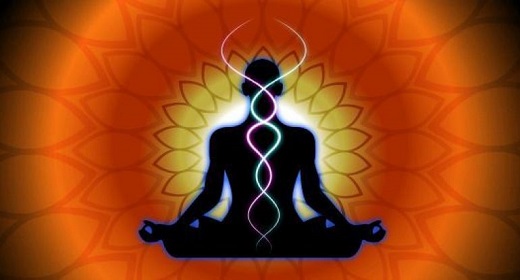There’s a better way to find answers to your most essential and existential…
“The practice of the limbs of yoga destroys impurities; thereafter, knowledge continues to brighten all the way to viveka khyati, the domain of unshakeable discernment.” (Tigunait, 2.28)
We hear story after story of the fallen gurus—of sexual abuse, of harassment—in the yoga community. All the major lineages of yoga have some form of abuse in their past (or their present).
The stories that we don’t often hear are the stories of the scores of students of these dethroned gurus who were desperately seeking sanctuary because they felt lost in the unwelcoming void of contemporary life. People like me who were searching for answers to the most essential and existential questions of human existence: Who am I? Why am I here? How do I find peace?
We were lucky enough to find yoga, an ancient, indigenous source of mind-blowing wisdom and supremely effective practices. Unfortunately, the vehicles for these teachings have too often been weak, egotistical humans who may not have been up to the challenge of living the teachings themselves.
So, time after time, we’re left with the question of whether we can separate the teacher from the teachings. What do you do if you spent 10 or 20 years studying yoga with someone who you later find out was sleeping with his students? What if you learned your teacher had been physically abusive. Or held sexist or bigoted views? Does their behavior negate the growth and learning you received under their tutelage?
Embracing your inner teacher
Perhaps these aren’t the questions we need to be asking. Instead, perhaps we can ask ourselves whether we can embrace our own inner teacher? While yoga teachings extol the virtues of the guru, perhaps the focus of that devotion was not meant to be an actual person. Instead, maybe the focus of our devotion should be the guru tattva, the guru principle that lives in our own heart?
True, we all need guidance on this life path, but at some point our yoga practice gives us access to our own intuitive wisdom, and a deep understanding that transcends the mind. Effective yoga instruction leads us to this well of inner knowledge, rather than keeping us externally focused on what our teacher is telling us to do.
Discernment or dependency
According to the Yoga Sutras of Patanjali, the main obstacle to our enlightenment is our spiritual ignorance, avidya. All the practices of yoga are designed to remove the veil that blocks the vision of our effulgent spiritual essence. Patanjali explains that to overcome spiritual ignorance we need to discern the parts of us that are constantly changing—the body and mind—from the part of us that is never-changing: the spirit. This ability to discern and to see clearly, called viveka, is one of the main goals of our practice.
In the case of our gurus, it’s important to reflect on whether they are leading us toward this domain of unshakeable discernment, or if they are asking us to be more and more dependent on them.
We must give the same consideration to other contemporary figureheads as well. We’re often asked to put our faith in political leaders, and to follow them blindly. Many politicians use scare tactics to herd us–prodding us with fear. These “leaders” use claims of fake news and alternate truths to sow confusion and foment fear. It’s a short step from there to donning a horned headdress and storming the Capitol.
Conspiracy theories and cults work similarly, feeding on our fear and loneliness, as they guide us down dark and dangerous paths. This is what has happened with QAnon and their conspiracies that have spread like wildfire throughout the yoga world. It is painful to realize that some of the people who stormed the Capitol on January 6 claim to be yoga practitioners. I’ve heard of at least three teachers or studio owners who were there. Sadly, this seems like another chapter in a long tale of yoga cults and indoctrination. A tale of people being manipulated in the guise of spiritual awakening.
Why yogis are open to influence
We come to yoga seeking answers, open and ripe for influence. We know that questioning reality is an essential part of spiritual practice, but we don’t see how deeply we endanger ourselves when we open ourselves up to the influence of people who are not practicing the principles they purport to teach.
Of course, we all need guidance in practicing these teachings, but we tend to get stuck when we find a teacher who is able to help us dig just a little deeper. Once we begin to feel the benefits of the practice and the teaching, and we get a glimpse of that inner light, we tend to identify our teacher as the source of that awakening. It’s like our inner light is so appealing, that whoever points us to it is forever identified as its source. But yoga teaches us that the light we seek has always been there.
It reminds me of Dorothy in The Wizard of Oz, endlessly searching for the Wizard to help her get home. When she finally gets a glimpse behind the curtain, she finds a little man whose power is a pretense. After her long, roundabout journey trying desperately to get home, Dorothy pleads with Glinda the Good Witch, “Oh, will you help me? Can you help me?” Glinda finally explains to Dorothy, “You don’t need to be helped any longer. You’ve always had the power…”
In the end, Dorothy finally realizes that she is the source of her own joy—and her own awakening.
And so are we. The answer to our challenge is equally simple: ethics, the plain, uninspiring truth of the yoga journey. It’s not by chance that the eight limbs of yoga begins with ethics. Yoga is not so much rainbows and fireworks as it is non-harm and truthfulness. Our deep existential questions need to be held within the embrace of the ethical teachings of yoga. Are we harming, lying, stealing, being greedy? In other words, if the teachings aren’t ethical, they aren’t yoga.
Be empowered in your practice
As part of keeping your practice free from the influence of unethical leadership, you can also take positive action to claim the power that is yours to begin with. One way is to deepen your personal practice, and find ways to make your practice more and more your own. This means building a practice that supports you wherever you are on any given day, at any given moment—being creative and sensitive to your own needs. Often we’re trained to practice in a particular way, and the internalized voice of our teacher can be hard to overcome. But brave internal listening can lead to a more fulfilling and beneficial personal practice.
One simple practice that helps me is to reflect back over my lifetime and think of the parts of me that were the same over all that time, and to also consider the parts that have changed. I think of my earliest memories, when I was a small child, when I was a teenager, when I was a young adult, and so on. I ask myself if there is an essential part of me that has always been there as my body and mind changed? This is my spirit, my true self. Realization of this essential spirit is the goal of yoga, and my job is to deepen my connection to this place within.
Our gurus are not infallible. None of us are. That is why we have yoga principles and ethics to rely on as we continue our path. Those and the guru within.
Is your yoga community safe?
Yoga offers powerful practices that can transform our lives. But these practices can also be used to control us and mislead us. As we continue on our own spiritual journey, it’s important to occasionally pause and check in with ourselves. We need to make sure that we’re not being misled or controlled by our teacher or community. To cultivate this discernment, it can be helpful to reflect on the ethics of the people with whom you practice. If you are questioning the ethics and practices of someone in your community, here are some questions to ask yourself:
- Am I giving up my power to this person or community?
- Have I been asked to compromise my ethics in any way?
- Have I seen this person or community harm another person in word or in action?
- Could I leave at any time without any negative repercussions to my quality of life?
In turn, you can turn inward and ask yourself if your current practice is working well for you:
- Do I feel more peace and contentment in my life?
- Are my relationships getting better?
- Am I building a practice that sustains my body, mind, and spirit throughout my entire life?
- How could my practice be even more supportive of my goals?
Jivana Heyman, C-IAYT, E-RYT 500, is the founder and director of Accessible Yoga, the author of Accessible Yoga: Poses and Practices for Every Body (Shambhala Publications, November 2019), and the upcoming book, Yoga Revolution: Building a Practice of Courage and Compassion, coming fall 2021.

















































